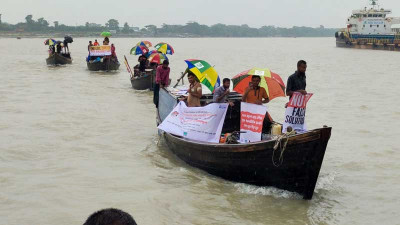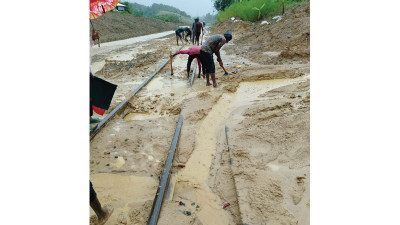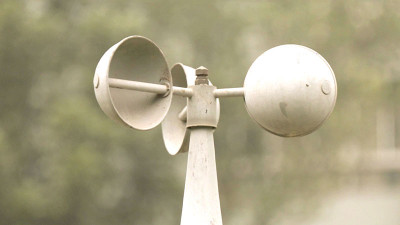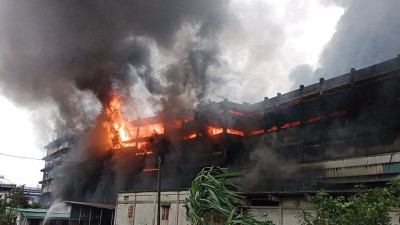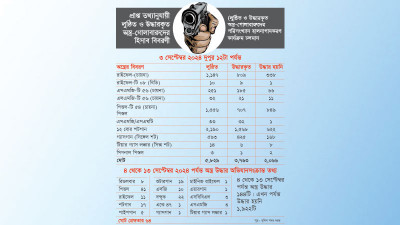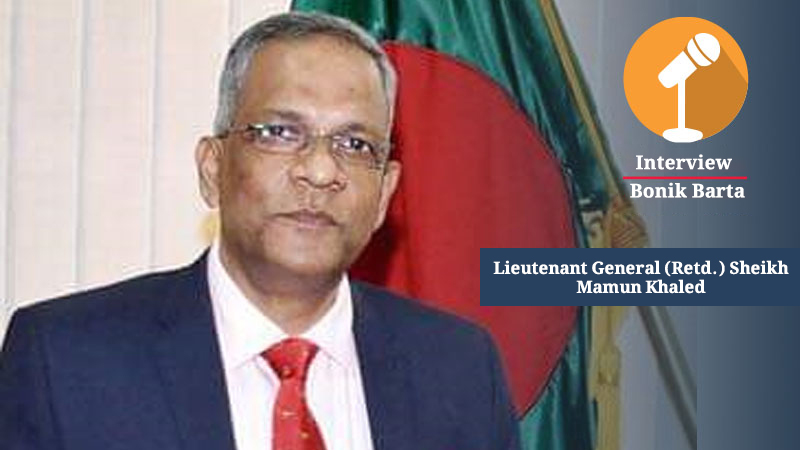 Photo: Bonik Barta
Photo: Bonik Barta Lieutenant General
(Retd.) Sheikh Mamun Khaled, a figure of immense influence, served as the
Director of the Directorate General of Forces Intelligence (DGFI) from December
2007 to December 2010 and as the Director General of the same organization from
June 23, 2011, to March 7, 2013. His tenure, often alleged to have played a
significant role in establishing Sheikh Hasina's 15-year fascist government, is
a crucial period in the political history of Bangladesh. He spoke with Bonik
Barta about his tenure at DGFI, the events in the organization, and the
country's politics during and after his tenure. Interviewed by Anika Mahjabin.
You held important and
top positions in DGFI for two terms. During that period, DGFI was allegedly
involved in various controversial activities. Tell us about this.
During my two tenures
at DGFI, I held two different responsibilities. In 2007, I was an officer of
the Forces Signal Intelligence Bureau (FSIB) in DGFI. Here, the responsibility
is to look after all the communications of DGFI. Later, in June 2008, during
the running of One-Eleven, I was responsible for the Counter Intelligence
Bureau (CIB). At that time, I convinced the DG of DGFI. General Golam Mohammad
was the DG at that time. He again convinced the army chief, and we started the
selection process. Then, the election was held on December 28, 2008. The new
government came to power through this election. After that, I was the director
of DGFI for one more year. Later, by the grace of God, I got promoted and left
as Log Area Commander.
I was later appointed
DG in 2011. After that, I worked here for one year and eight months. On March
7, 2013, after coming home from the program, I suddenly heard that I had been
appointed Vice Chancellor of Bangladesh University of Professionals (BUP).
You were the director
of DGFI during the BDR rebellion incident. Did you get any information about
this before it happened?
There is a unit called
the Rifles Security Unit (RSU) in the Border Guard Bangladesh (BGB). Our
responsibility there was as an auxiliary force. However, we were aware of a
leaflet being distributed. This information reached us around February 22-23.
The leaflet contained various demands and also mentioned a food program. When
the Dhaka Detachment Commander provided this information, it was conveyed to
the RSU of BGB. They noted that they were also aware of the leaflet incident.
Until February 25, I only had this much information. However, further
investigation may have revealed more details. General Jahangir might now
disclose the results of his investigation.
According to the
information you gave at that time, what kind of action was taken by the
government?
The RSU had said that
they were aware of the situation and likely took measures, as a significant
program was scheduled there. Since the then PM Sheikh Hasina was to visit on
February 24, the security on that day was likely very tight, involving SSF and
NSI. On February 25, however, the security might not have been as robust as the
previous day. There may have been some lapses in security, which could be why
the incident occurred.
What memories do you
have of February 25?
On February 25, 2009,
when I heard that such an incident was happening in BGB, I immediately headed
towards BDR. First, I tried to go through Sat Masjid Road. But weapons were pointed
in that direction. Then, I came from Dhanmondi's direction. Mirza Azam,
Jahangir Kabir Nanak, Sheikh Fazle Noor Taposh, and some other people came
there.
At the same time, the
chiefs of the army and navy were in Jamuna. At that time, the Prime Minister's
office was in Jamuna. Then, the DG of DGFI, DG of NSI, and DG of BGB were there.
Gen. Moeen U Ahmed was in Jamuna then. And I was on the ground
the whole time. I hear army people have come to Abahani field. But nothing
effective was happening. Then I saw the then Home Minister Sahara Khatun come.
I asked Sheikh Fazle Noor Taposh and Jahangir Kabir Nanak to know what was happening.
They said DGFI people are not needed here; we will have a meeting here. I
understand that since they have bad memories of the military, they will not
associate with us. They entered the meeting right before our eyes.
No effective decision
was coming to deal with the situation. We didn't understand why anything wasn’t
happening. Then I heard this is happening, that is happening, the force is
coming, and tanks are coming from Savar.
Were you waiting for a
decision at that time? How do you see the lack of a decision not coming in
time?
After all this time, I
still think the damage might have been reduced to some extent if the army had
taken quick action. I find it unusual that we do not have information about
such an incident or that the RSU has not noticed it. I will not blame the
military in any way. Those on the ground were ready for a decision. But at that
time, no decision came. Everyone was furious as to why the decision was not
forthcoming. The force was coming from 12 pm to 12.30 pm. And the cantonment is
not very far. Mobilizing them can leave within half an hour.
The soldiers were angry
because of the indecision at that time. We saw the manifestation of that anger
later when General Moeen U Ahmed called a meeting the next day. The next day,
when the then Prime Minister called, he was still there but expressed a lot of
anger about why the army was not allowed to go. That anger has not gone away
till today. The aftermath of the BDR rebellion incident was a period of intense
scrutiny and criticism, which significantly impacted the political and military
dynamics of the time.
When you were the DG of
DGFI, incidents of enforced disappearances occurred. Can you avoid
responsibility for this?
After the incident
involving Ilias Ali, I heard that such an event had occurred. However, I can
confirm that none of our personnel were present at that time. If they had been,
I would have known about it. Therefore, I could not connect in any way with who
was responsible or how it was carried out. Based on open-source intelligence, I
knew that an incident involving Ilias Ali had occurred. However, since we were
not involved, we do not have detailed information about it. Many people claimed
that DGFI was aware of it, but I want to clearly state that no incidents of enforced
disappearances occurred under DGFI from June 23, 2011, to March 7, 2013. I want
to emphasize this point clearly. I left the position of DG on March 7. When
necessary, terrorists are brought to the Joint Interrogation Center for
questioning, but no political figures are brought in for questioning.
I consider myself
fortunate that my tenure was brief. I left before the 2014 election, and by
God's grace, I was not involved in it. In that election, 153 seats were won
uncontested. Not being involved in such an election was a blessing from God.
The tenure of a DGFI is
never one year and eight months. General Mohammad Akbar Hossain remained till
February 2017, his tenure was four years. Then came Major General Saiful
Abedin, who served for three years. The normal tenure of DG is three years. My
tenure there was one year and eight months. The authorities removed me a little
prematurely. Later we saw a report by Netra News, a Swedish based media. Then I
found out that RAB was involved in Elias Ali's disappearance.
Chowdhury Alam went
missing in December 2010. You were the director of DGFI then. Did DGFI have a
hand there?
The case of Chowdhury
Alam's disappearance is also a political matter. We have heard about it in a
similar way. I was with DGFI during the time of Ilias Ali and Chowdhury Alam's
disappearances. Therefore, I can firmly state that DGFI was not involved in
these incidents.
You mentioned that RAB
was involved in the Ilias Ali incident. Were you instructed by higher
authorities to be involved in such activities?
To be honest, I did not
receive any such proposal. At that time, it seemed they might have realized
that I would not be able or willing to carry out such tasks. General Moti might
have told someone that Mamun Khaled has undergone a change. The decision to
post me elsewhere was made around December 2012, which is also a sign. Major
General Tarique Ahmed Siddique (Prime Minister's security advisor) had
mentioned that the DG of DGFI needed to be changed. I later heard this through
various channels. It seems they thought, "He won’t be able to handle it.
We won't be able to do what we want with him. So, replace him and bring in a
new setup."
In 2018, General Aziz
Ahmed was appointed instead of appointing you as the Chief of Army Staff. Why
was this decision made?
You can understand why
I was not appointed by reviewing my record. The performance that General Aziz
Ahmed delivered in the 2018 election is something I would not have been able to
achieve. Similarly, General Iqbal Karim Bhuiyan in 2014 or General SM
Shafiuddin Ahmed's role in 2024 would have been crucial parameters for the
Prime Minister in considering someone for the Chief of Army Staff position.
Therefore, when I was removed from the position of DG of DGFI before my term
ended in 2013, I realized that my chances of becoming the Chief of Army Staff
were slim.
During Sheikh Hasina's
government, there have been allegations that many individuals were not promoted
according to their qualifications, and many faced court-martial. What kind of
damage has this caused to the army?
Maintaining the
integrity of the army's system lies with the Chief of Army Staff. If the army
chief performs well, the organization functions well. If they fail to do so,
they harm their organization. Until 2020, I was on the board. Promotions in the
army always occur through the board, but during General Aziz's tenure, I
noticed some promotions were being made outside the board. I heard they were
creating a note and taking it to the then Prime Minister for signature to
approve these promotions. This was referred to as "note sheet
promotions." Such promotions did not occur before 2016-17; General Aziz
started this practice.
In our system, one
cannot become a Lieutenant Colonel without passing the PSC (Professional
Examination), but some have been promoted to Major General. The Chief of Army
Staff made these promotions. In the army, such matters were very transparent
until a specific period.
During Sheikh Hasina's
government, the former Chief Justice was brought to Bangabhaban. The then-Prime
Minister and President pressured the Attorney General, but he did not yield. He
said, "No, I cannot do this." The current Army Chief, General
Waker-uz-Zaman, has shown similar courage.
Although he is the
son-in-law of General Mustafiz, and despite being a relative of Sheikh Hasina,
he has demonstrated his integrity. Why did previous army chiefs not show such
courage? Why did they promote unqualified individuals? It is not enough to
blame only those who received promotions; those who granted the promotions are
also to be held accountable. When mediocre leaders start to govern, they begin
promoting mediocrity.
You are talking about
General Waker-uz-Zaman's courage. If you were in his position, would you have
arranged for Sheikh Hasina to be sent to India?
That's an internal
matter. I can't say exactly under what circumstances or why she was sent to
India. She might have stipulated that she could resign but needed to be sent to
India. Perhaps Sheikh Hasina set this condition. At that time, saving the
country was crucial. There could have been more violence. To avoid any
undesirable situations, sending her abroad seemed the right decision because
the country's well-being comes first.
If you could explain in
detail the reasons for being removed just before the elections instead of being
retained for three or four years.
I cannot specify the
exact reasons. However, I believe it was because my performance was not
satisfactory then. I was unable to meet the government's expectations as the DG
of DGFI. There was no direct reason provided. It can be inferred from the
premature posting. If someone is given a promotion posting, that is
understandable. However, if someone is posted to a different position at an
identical rank in a less significant role, it suggests that perhaps I was not
performing as expected. At that time, I had no failures, but suddenly, my
posting was changed.
Which aspect of your
performance do you think led to this decision?
The government might
have thought that with the upcoming elections, a lot of activity would be
required, and perhaps they felt that I might not be able to handle it or
wouldn't handle it. Otherwise, such a change before the election would not have
been made. After that, I did not receive any significant postings. I went to
the Bangladesh University of Professionals (BUP), then to the BUAF, and later
to the NDC. I was not given a position at the Army Headquarters or any
significant organizational role.
How did the DGFI become
a tool for controlling politics?
I think both the
orderer and the implementer are to blame here. That is, both the one who made
the instrument and the one who made it are responsible because no one is
expelled for disobeying an immoral command. Maybe posting in unimportant
places. As I was given.
I worked for all
political parties to participate in the 2008 elections. I worked in an
intelligence position. At that time I myself went to Begum Khaleda Zia's house.
I told him to come. Why was there no multi-party election in 2014, 2018 and
2024? During these times asked DGFI DGs why they did not try in this regard.
I believe that every
organization should be used for the purpose for which it was created. Now Major
General Faizur Rahman is not listening to everyone. He is not involved in
politics. Because Professor Yunus understands. So he is not involving DGFI in
politics.
When I was a young
officer, I didn't understand anything except PT and going to camp in the
morning. In 2012, the Army began engaging in various activities. Army personnel
can be seen everywhere, starting from the streets. The army should stay inside
the cantonment. The army will come out of the cantonment in case of emergency
or flood. The army should be brought back to the cantonment after this year.
The Army should not be used to supervise the construction of any kind of
infrastructure, starting with the Padma Bridge.
There are allegations
that the DGFI played a role in organizing the Shahbagh Gonojagoron Mancha in
2013. What is your opinion on this matter?
We had no involvement
or sponsorship in this. At that time, I went there just to observe what was
happening.
Do you believe that the
2024 coup will bring about a change in Bangladesh's two-party political system?
Will new politics emerge?
Since this revolution
has given freedom, I think political parties should come. The more political
parties come, the better. The Gen-G generation needs to be led. This is
happening in Canada and New Zealand. We have a tendency here that you don't
want to leave once you get a job. This needs to be changed.
Prof. Yunus is now
joining everyone based on educational qualifications. That is, we have to be
based on merit here too. I think that will happen in the coming days. Faham
Abdus Salam talks about two things, meritocracy and rule of law. And to this I
would add one—honesty.
How will you address
the killings carried out by government forces during the July-August uprising?
I would call it a
failure of leadership. A country would not have been in this situation if it
had proper leadership. All the countries that had good transitions, such as
Singapore and South Korea, had the right leadership. Leadership is a top-down
process. If leadership is good at the top, it will always be good at the
bottom.
The police were turned
against the people for ineffective leadership. It is not right to allow the
police to shoot with lethal weapons. As a result, many civilian lives were
lost. Tunisia, as seen from Egypt, erupted from pent-up anger. Here, the
ordinary people were angry. Three elections were held in which no opposition
participated. They should have understood that, at some point, people would
revolt. Here it is. What do you do if your back is against the wall? You have
to come to the front then.
But her (Sheikh
Hasina's) leadership could have been better. Many people are talking about
people around her lately. But he was taking the decision alone. If the people
around him had been wiser and more conscientious, they would have caught the
thing long ago. She might have lost in the 2014 elections, but the way to come
would have been open. You won 153 seats without elections. In 2018, she was
elected at night. Again, in 2024, there will be a new type of dummy election.
No democratic country conducts elections like this.
What is the likelihood
of rehabilitation within the Awami League's politics?
Given Sheikh Hasina's
age, political rehabilitation is unlikely. However, given how the Awami League
has been operating for the past 15 years, reforms are necessary. The public
will not easily forget the events of this time. Significant changes will be
required, and only then might there be a chance for a return shortly.
What is your opinion on
the discussions regarding reforms in the state system?
I believe it will take
about one or two years to change the system. After that, the new leadership
will need to follow through. Otherwise, it will be apparent that the public
will rise if they do not adhere to the established system.
Important positions
within law enforcement agencies must rapidly change, while less critical posts
can remain. Changes are already underway in the DGFI and NSI. It will take
about five to seven years to complete the reforms because those appointed over
the past 15 years have reached the director level and will gradually retire.
Therefore, the system should be started as soon as possible, and it will take
about five years to implement fully. Professor Yunus has begun, and the people
will decide what happens next.

